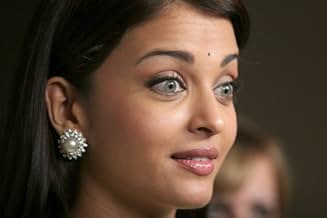ÉVALUATION IMDb
7,7/10
25 k
MA NOTE
Ajouter une intrigue dans votre langueA villager, Gurukant Desai, arrives in Bombay 1958, and rises from its streets to become the GURU, the biggest tycoon in Indian history.A villager, Gurukant Desai, arrives in Bombay 1958, and rises from its streets to become the GURU, the biggest tycoon in Indian history.A villager, Gurukant Desai, arrives in Bombay 1958, and rises from its streets to become the GURU, the biggest tycoon in Indian history.
- Prix
- 18 victoires et 38 nominations au total
Aishwarya Rai Bachchan
- Sujata
- (as Aishwarya Rai)
Madhavan
- Shyam Saxena
- (as R. Madhavan)
Anaushka Dantra
- 7 Year Old Baby Anaushka
- (as Baby Anoushka)
Mukesh S. Bhatt
- Ram Lal
- (as Mukesh Bhatt)
Ashoi Dantra
- Twin Baby Ashoi Dantra
- (as Baby Ashoi)
Histoire
Le saviez-vous
- AnecdotesCertain techniques are slowly changed within the film to mark the passing of time and the growth of Guru as an individual: - When Guru is a young man in Turkey, the camera is handheld and in perpetual motion, giving Guru and that period of his life a racy, edgy feel. As he ages, the camera movements become smoother and towards the end of the film the camera is almost stationary. - The editing closely follows the above concept: the young Guru is shown in quick cuts and as Guru grows older the editing is smoother and becomes less frequent. - Lighting also changes with the times In Turkey, direct and specular lights were initially used to capture the aura of a foreign land, thus producing a sepia-yellow phase. Then the lighting changed to the more directionless soft light seen in the early and middle 1960s. In the late 1960s and early 1970s, tube lights came into style, thus producing a dramatic cyan-green light needed for the climax.
- GaffesIn the scene where Abhishek Bachan is addressing his first AGM in a "pandal", he is seen loosening his tie, but in the next scene his tie is fully knotted. Then again in the next scene, his tie changes length and becomes much shorter.
- Citations
Gurukant Desai: You gave me five minutes to talk, I finished in four and half minutes, that's 30 seconds profit. PROFIT!
- ConnexionsFeatured in 53rd Filmfare Awards (2008)
- Bandes originalesBarso Re
Sung by Shreya Ghoshal and Uday Mazumdar
Composed by A.R. Rahman
Lyrics by Gulzar (as Sampooran Singh Gulzar)
Commentaire en vedette
The beautiful photography of India, superb acting, and realistically told modern historical story make Guru a good choice as an eye-opener for someone who doesn't know Bollywood so well. And though the music is extraordinary, there is also somewhat less of it than sometimes.
Guru is the story of the rise of a man from a village to become the owner of maybe the most successful business in India (a textiles manufacturer), which also benefited its mass of middle-class shareholders in an unprecedented way. It spans 30 years. The film is said to be based closely on the story of a real person. It seems intended to inspire Indians to overcome the obstacles presented by corrupt practices, and it raises the question as to what is the appropriate response to a closed and corrupt system that forecloses legitimate opportunity.
It is a joy to find oneself in the hands of a master like Mani Ratnam. I'd wondered if I'd find this movie at all dull or slow: I did not. It moves along - there's a lot of plot going on all the time. I would guess that we get from Guru's village origins to his years working in Turkey to his arrival in Bombay as an adult ready to go into business in less than 20 minutes.
Abhishek Bachchan gave a lovely performance as the son of a village schoolteacher who isn't much of a student, to his father's dismay. He declares his intention to have his own business, and disregards his harsh father's negative predictions about his prospects. The character, Gurukant Desai, has a wonderful spirit - doesn't take no for an answer, also can laugh off irritants and obstacles, and the laugh is charming, at once boyish and manly. He's "big" as a personality, and Abhishek is emotionally and physically up to it - you feel his great reserves of self-regard in the various ways he meets opposition, whether from family or business-world characters.
One of my primary responses to seeing the film today was gratitude to be able to see it on a big screen. The movie occurs in city and countryside, the 50s through the 80s. Every visual image, and the whole field of the movie - scenes, sets, costumes, ambiance, acting style, music - worked together to tell an appealing story with a strong appreciation for India, as well as a potential inspiration and warning.
I think a good test of a bio-pic, or pseudo-bio-pic, is whether or not somebody who doesn't know much of anything about the putative subject, which is me (in this case, the reference subject is a super-businessman named Ambani), experiences the story as having integrity, and for me this entirely passes that test.
And it's nice to see a Hindi movie in which parental disapproval is met with a "cut your losses" response rather than the sometimes maudlin kind of pining or carrying on about an "incomplete" life we often run into. Moreover, this dynamic is not at all irrelevant to other levels of meaning in a story about a man in India who take on large defeatist cultural expectations to achieve success. How should we respond to Father or principles or rules that are truly not serving our interests? It is also not irrelevant to how he plays his hand in relation to the corruption and cronyism he meets when he goes to Bombay to make his way.
Aishwarya is fine in a wife-from-the-village role who is a partner all the way, and I love her dancing. She also shows a definitely womanly aspect as the movie goes on. I am glad to see her in a role that does not confine her to the vulnerable-verging-on-breakable girl she is sometimes stuck in.
Mithun Chakravorty (of Disco Dancer fame) was nothing but perfect as a newspaper owner who was a father figure to Gurukant and also significantly opposed some of his decisions. The presentation of that complex relationship is a giant strength of the movie. I don't recall running into this before, a scenario where an older generation figure is out to bring down a "son" and the love between them is dramatized as going on nonetheless. I found it emotionally powerful, and insofar as there is a background allegory about India, excellent, about opposing and maintaining ties.
In a subplot that I couldn't find the rationale for, Vidya Balan as a lame girl and Madhavan as a journalist with high ideals and non-idealistic practices were appealing and romantic.
Guru is the story of the rise of a man from a village to become the owner of maybe the most successful business in India (a textiles manufacturer), which also benefited its mass of middle-class shareholders in an unprecedented way. It spans 30 years. The film is said to be based closely on the story of a real person. It seems intended to inspire Indians to overcome the obstacles presented by corrupt practices, and it raises the question as to what is the appropriate response to a closed and corrupt system that forecloses legitimate opportunity.
It is a joy to find oneself in the hands of a master like Mani Ratnam. I'd wondered if I'd find this movie at all dull or slow: I did not. It moves along - there's a lot of plot going on all the time. I would guess that we get from Guru's village origins to his years working in Turkey to his arrival in Bombay as an adult ready to go into business in less than 20 minutes.
Abhishek Bachchan gave a lovely performance as the son of a village schoolteacher who isn't much of a student, to his father's dismay. He declares his intention to have his own business, and disregards his harsh father's negative predictions about his prospects. The character, Gurukant Desai, has a wonderful spirit - doesn't take no for an answer, also can laugh off irritants and obstacles, and the laugh is charming, at once boyish and manly. He's "big" as a personality, and Abhishek is emotionally and physically up to it - you feel his great reserves of self-regard in the various ways he meets opposition, whether from family or business-world characters.
One of my primary responses to seeing the film today was gratitude to be able to see it on a big screen. The movie occurs in city and countryside, the 50s through the 80s. Every visual image, and the whole field of the movie - scenes, sets, costumes, ambiance, acting style, music - worked together to tell an appealing story with a strong appreciation for India, as well as a potential inspiration and warning.
I think a good test of a bio-pic, or pseudo-bio-pic, is whether or not somebody who doesn't know much of anything about the putative subject, which is me (in this case, the reference subject is a super-businessman named Ambani), experiences the story as having integrity, and for me this entirely passes that test.
And it's nice to see a Hindi movie in which parental disapproval is met with a "cut your losses" response rather than the sometimes maudlin kind of pining or carrying on about an "incomplete" life we often run into. Moreover, this dynamic is not at all irrelevant to other levels of meaning in a story about a man in India who take on large defeatist cultural expectations to achieve success. How should we respond to Father or principles or rules that are truly not serving our interests? It is also not irrelevant to how he plays his hand in relation to the corruption and cronyism he meets when he goes to Bombay to make his way.
Aishwarya is fine in a wife-from-the-village role who is a partner all the way, and I love her dancing. She also shows a definitely womanly aspect as the movie goes on. I am glad to see her in a role that does not confine her to the vulnerable-verging-on-breakable girl she is sometimes stuck in.
Mithun Chakravorty (of Disco Dancer fame) was nothing but perfect as a newspaper owner who was a father figure to Gurukant and also significantly opposed some of his decisions. The presentation of that complex relationship is a giant strength of the movie. I don't recall running into this before, a scenario where an older generation figure is out to bring down a "son" and the love between them is dramatized as going on nonetheless. I found it emotionally powerful, and insofar as there is a background allegory about India, excellent, about opposing and maintaining ties.
In a subplot that I couldn't find the rationale for, Vidya Balan as a lame girl and Madhavan as a journalist with high ideals and non-idealistic practices were appealing and romantic.
- VirginiaK_NYC
- 11 janv. 2007
- Lien permanent
Meilleurs choix
Connectez-vous pour évaluer et surveiller les recommandations personnalisées
- How long is Guru?Propulsé par Alexa
Détails
Box-office
- Budget
- 150 000 000 INR (estimation)
- Brut – États-Unis et Canada
- 2 096 000 $ US
- Fin de semaine d'ouverture – États-Unis et Canada
- 760 000 $ US
- 14 janv. 2007
- Brut – à l'échelle mondiale
- 24 108 727 $ US
- Durée2 heures 42 minutes
- Couleur
- Mixage
- Rapport de forme
- 2.35 : 1
Contribuer à cette page
Suggérer une modification ou ajouter du contenu manquant

































